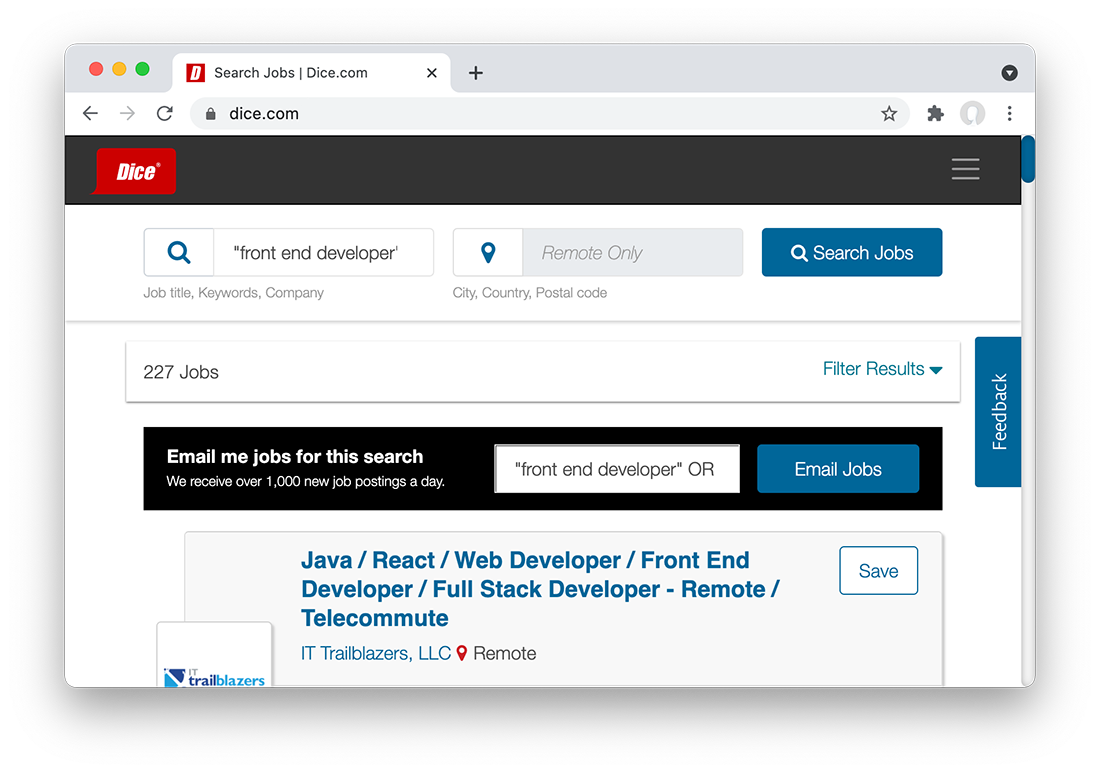Introduction to Careers in Tech
We're sure you're eager to hear all about the amazing career opportunities that await you on the other side of this journey. But let's take a step back and first understand the skills you will be gaining. Learning how to code opens up so many opportunities beyond career flexibility and earning potential, so it'll be helpful to have a firm grasp to guide you towards the correct path for you.
The Skills You'll Gain
Technical Skills
As you would expect from any software development education experience, you'll learn the fundamental concepts of computing and modern programming languages. You'll gain a firm foundation in Computer Science while learning all about JavaScript. Why JavaScript? Well, not only is it the most prevalent language required for tech jobs these days, but it's also a very versatile language making it a great vehicle for learning all the basics.
We'll introduce you to User Experience (UX) concepts, so the websites you build are positive and accessible experiences for your users. With your Front End Web Development skills, you can create engaging websites with interactive user interfaces (the part of the website you see when you visit a page). You'll also learn how to build the data processing and storage functionality for dynamic web applications (the part that stores data and communicates with a web server when you click on a page, for example). Through weekly live sessions, you will be introduced to Agile Methodologies to manage your work and meet your deliverables as a part of a modern software development team.
21st Century Skills
As important as the technical skills are, those who are most successful in their careers have strong 21st Century Skills (or soft skills), taking them to the next level. Through Ubora we will help you cultivate essential habits of mind. Through presentations and project work, you'll get to practice your communication skills (written, oral, and digital). There will be plenty of opportunities to flex your strategic and collaborative problem-solving skills.
We also know there is a wealth of experience you are already bringing to the table. That has value! We will walk you through showcasing all of those transferable skills from your previous life, academic, and professional experiences to help you stand out when starting a new career.
Job Search Skills and Strategies
There are more opportunities than you'll know what to do with when looking for your first job. "Breaking into the industry" is competitive but not impossible. The best opportunities available to you depend mostly on your location, background (including education/experience and soft skills), and interests (including needs).
We'll provide you a framework to help you find the opportunities that best meet your needs. We'll coach you through making each interview the best use of your time so you can effectively vet each employer and find that right fit. Within tech, there are opportunities everywhere (even remote!), in every industry, making it easy to align your career with your passions and goals. We'll also help you navigate compensation packages, so you can balance the salary you need to pay the bills with the perks you want to enjoy life.
"Today, no company can make, deliver or market its product efficiently without technology." ~ [Forbes Technology Council, 2017]
These days, every company is a technology company. Some are obvious, like software companies and app development brands. But there isn't a business that runs without some technology these days, from shopping online at your favorite store to consuming news or connecting with friends on social media. We've helped train engineers at companies that build the software to run the restaurant industry, marketing automation, and telecommunications. We would be honored to prepare you for your career, too!
Jobs in Tech
General Developer or Engineer Roles
So, what doors will open for you after learning how to code? Let's start with some common roles that you might already be familiar with first: Software Developer, Software Engineer, Web Developer, or Full-Stack Developer.
These are common titles you hear for "coders," and they are relatively interchangeable with some nuance. But, at its heart, these are all jobs where you write code to build software or programs and other operating information used by a computer. In this role, you can expect to work on a team that builds software to meet a business need. At times your client may be the company's clients, and for other projects, your client may be colleagues in need of an internal tool. You'll be given project requirements and a deadline to meet them. Each company handles this a little differently, but often there is a project manager (or similar) helping to manage the overall project so you can focus on your piece.
Specialized Roles
While those roles are for a generalist, many developers choose to specialize, which gives us job titles such as Front-End Web Developer, Back-End Web Developer, Mobile Developer, or API Developer, to name a few. This is helpful to know as you begin your learning journey as you will likely find you have a strong preference for working on specific aspects of software development - and that's okay!
While our Techdegree will expose you to both Front End (the part of a website you see while on the internet) and Back End (the data exchange behind the scenes), chances are you will find one of those clicks a bit more easily for you. For some, this can cause concern that they aren't great at all the aspects of writing software. But, actually, this is completely normal. It's good to still have a firm foundation in both Front End and Back End, but know that you can specialize in your preferred area for your career. Teams are intentionally built to have folx specializing in different areas for this very reason. So don't let it stop you from moving forward!
Quality Assurance Roles
Many developers love to build a solution. They often typically enjoy puzzles and creative endeavors (like music or baking) in their free time. Finding a solution to a difficult problem is energizing to them! But what if that's not you? What if you prefer to break something rather than fix it? Quality Assurance (QA) might be a great fit for you! QA teams come in and test software to ensure it meets the requirements set by the client and ensure there aren't any issues with it. Many QA Engineers still write code to automate tests. Folx in QA tend to be detail-oriented and thorough. They love to poke around at something to figure out what makes it work and what makes it fail - all with the goal of making the end product even better.
Non-coding Roles
If you find that you love to code and want to do it all day, every day, then any of these above options are great for you. But what if you don't? It takes more than just software developers to form a well-functioning team. User Experience (UX) is an essential piece to building accessible and well-designed software, and it doesn't require you to write code. Folx who work in UX seek to understand the end user's needs and pain points. They consider accessibility concerns and help inform the overall design and flow for the software that is to be built. A career in UX involves a lot of market research, strong presentation skills, and user empathy. Some who work in UX cover all aspects of user experience, while others might specialize as a UX Designer or a UX Researcher.
There are also roles in Project Management, Business Analysis, Data Analysis, Data Science, Marketing Automation… the list goes on and on! Understanding the basics of Computer Science can take you to many places. For now, focus on learning the basics and be aware of which parts you enjoy the most. This will help guide your job search and career path.
The Job Search
We know job searches can be tedious and even a little scary at times. We will help you prepare and even share some tips and tricks to make it as painless as possible. While we recommend you don't dig into your official job search until you've completed your learning journey, familiarizing yourself with job descriptions now can be beneficial. Doing this while you learn will help you determine which path or paths make the most sense to focus your efforts once it is time. And, you can see which skills are most in-demand in the current job market as well!
There are three key areas I would focus your job market research around: aggregate job search engines, digital networking, and in-person networking. Let's take a deeper look at each of these.
Aggregate Job Search Engines
While there are more job search sites than we have time or space to mention, we highly recommend focusing on a few of the aggregate sites like Indeed or Dice (which focuses on jobs in tech). We know, they list a ton of openings, but they also have great filters available. And, you can set up automated searches so that you get an email each day or week with the new listings that most closely match your needs.
Setting up a variety of searches will allow you to cast a wider, yet defined, net. You will want to compose searches with these categories:
Dream Companies: Create a list of your top 5-10 companies and list them in your search string. If the company has a wide variety of jobs, then you may also want to add some titles or technical skills. Here is an example:
(treehouse OR google OR apple) AND "front end developer"
Top Skills: Create a list using the skills you most want to put to use. Here is an example:
css AND html5 AND (javascript OR node OR react) AND bootstrap
Top Titles: Create a list using your target job titles. Try to include many variations of the same title. Here is an example:
"front end developer" OR "front-end developer" OR "web developer" OR "front end web developer" OR "front-end web developer"
Now, view the results. Is this search bringing up the types of positions you were hoping to see? If so, you will want to save this search, so you are automatically notified every time a new job matching your description hits the board, saving you time while keeping you up to date. Each morning, just check your inbox for new roles.
"The requirements are really more of a wish list."
While you'll be seeking Junior or Entry Level roles to start, they don't always use those words in the job titles or descriptions. Some may list a requirement like 0-3 or 1-3 years of experience instead. And, you'll see for many jobs you don't match the requirements 100%, but that is okay! The requirements are really more of a wish list. If you meet 80% then you are a match. If you meet over 50%, go ahead and apply for the practice. Maybe the 50% you have are the requirements most important to them. Besides, every job opportunity should also provide you with learning and growth - so it is fully expected that it will stretch you to some degree. A career in tech means you will be a lifelong learner. So ensure you are showcasing your curiosity and willingness to learn.
Digital and In-person Networking
The other essential element of an effective job search is networking, both digitally (via LinkedIn, for example) or in-person through events. Why is networking so important? Candidates who are referred by an existing employee double their chance of getting an interview. And, for those that make it through the interview stage, you have a 40% better chance of getting hired over other applicants. Not only that, but the overall process is shortened dramatically, and referred candidates typically hold their positions for much longer.
Why does this work? You've been vetted already, which is good for both your interests and the company's. You already have an insider view of the culture and type of work being done before you even submit your resume for consideration. This means it's much more likely to be a better match from the beginning. Sounds great, right? Now, how does one get a referral, you might ask. To have someone vouch for you, they have to know you. The best way to start building relationships in your new field is to attend networking events.
Networking has become a dirty word for many, but it is not this schmoozy thing that people assume. Think for a moment about people you know or have worked with (either past or current, volunteer or paid) that you would LOVE to work with again.
"If in any future job I need someone who can ____, I would call _____."
We all have that list. What we're trying to do by networking is create those moments where you are the person someone wants to call.
Job Opportunities Within Your Current Company
There might even be the opportunity to transition within your current company. You already have something an outside candidate will never have: internal business knowledge. Set aside some time to talk with leaders on the IT team about potential opportunities. Be willing to start small; maybe you can assist with some projects on the side to gain experience. Don't be afraid to ask them how they got started with their career. Listen and learn from their journey.
Next Steps
That was a lot of information. Don't feel like you have to retain it all right now, though! As your technical training through Ubora comes to a close, we will work with you to optimize your job search by offering resources and workshops, more tips and tricks, and even some opportunities to network with tech companies. And, you'll have fresh technical skills with a portfolio of projects to show off, which will help you stand out from the crowd.



